Kwiatkowski: I would regret if I didn’t try to race with the best climbers
Despite crash, Team Sky leader will continue to ride for GC at Vuelta a Espana
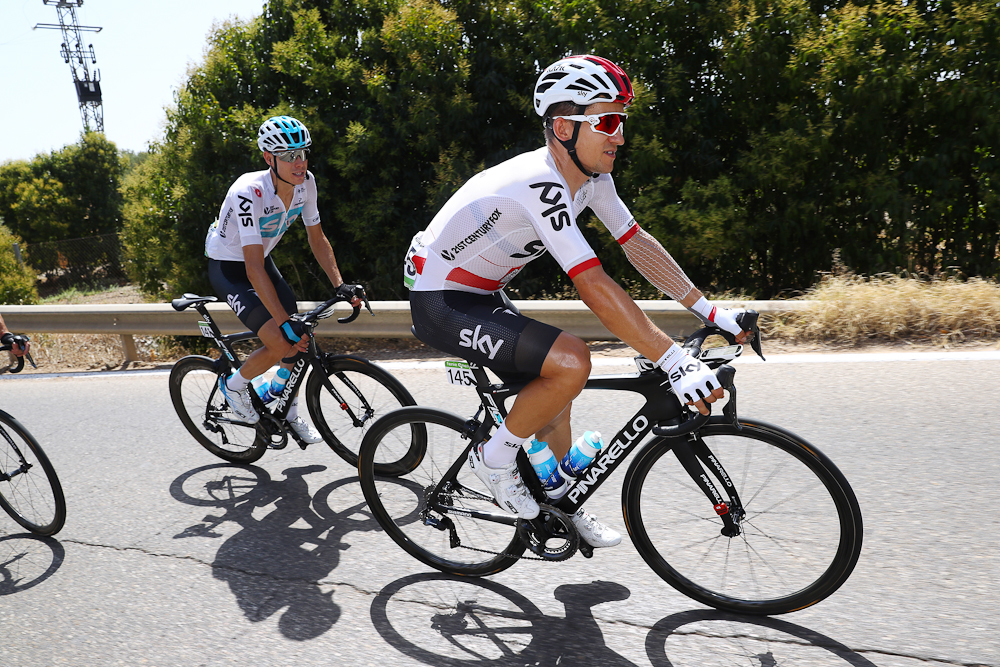
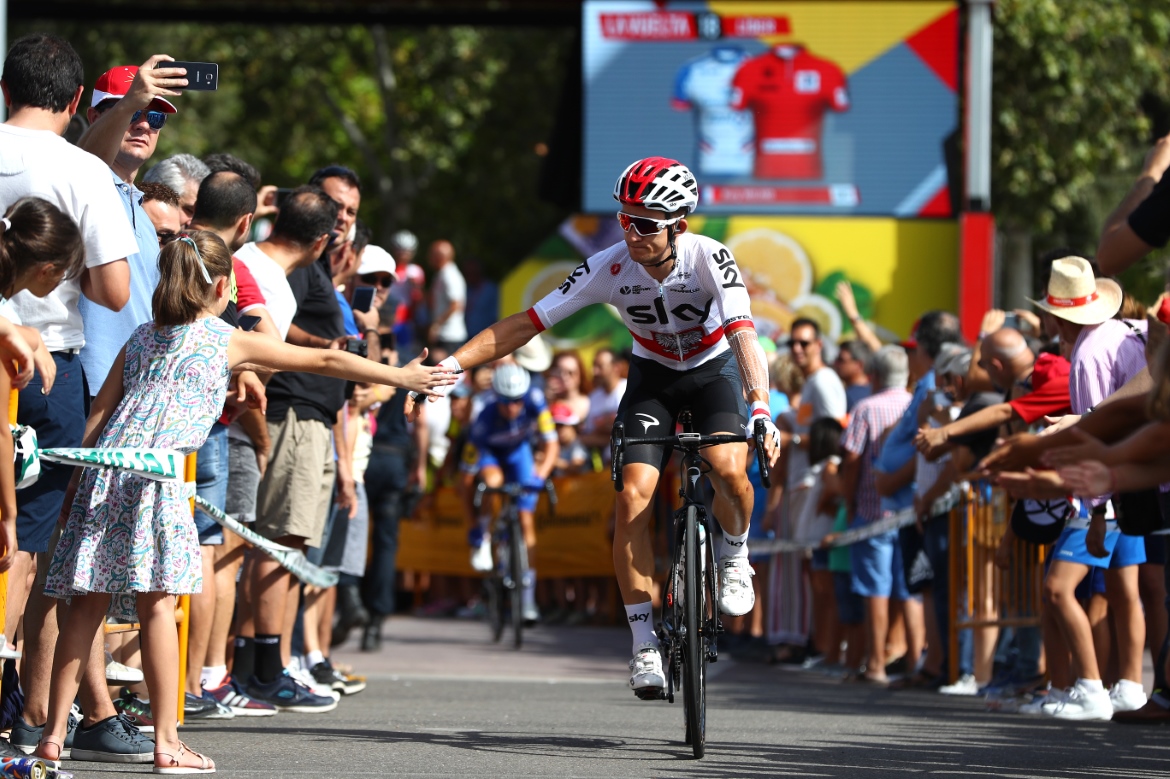
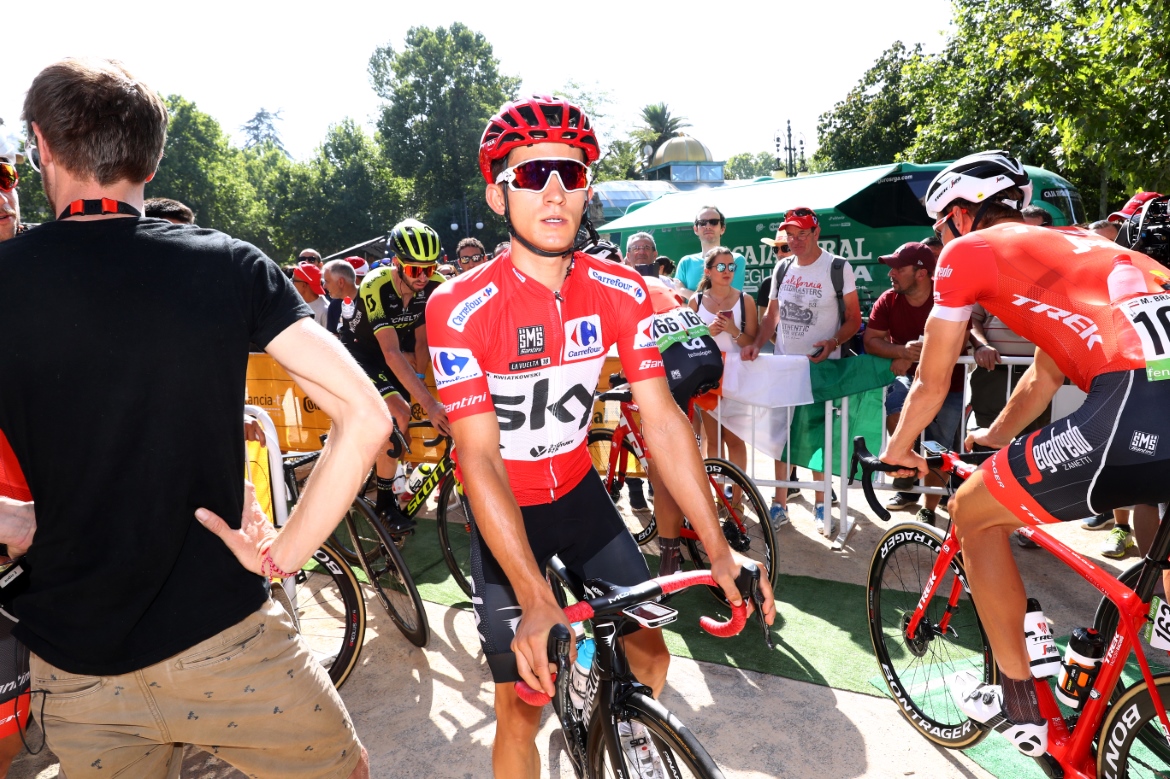
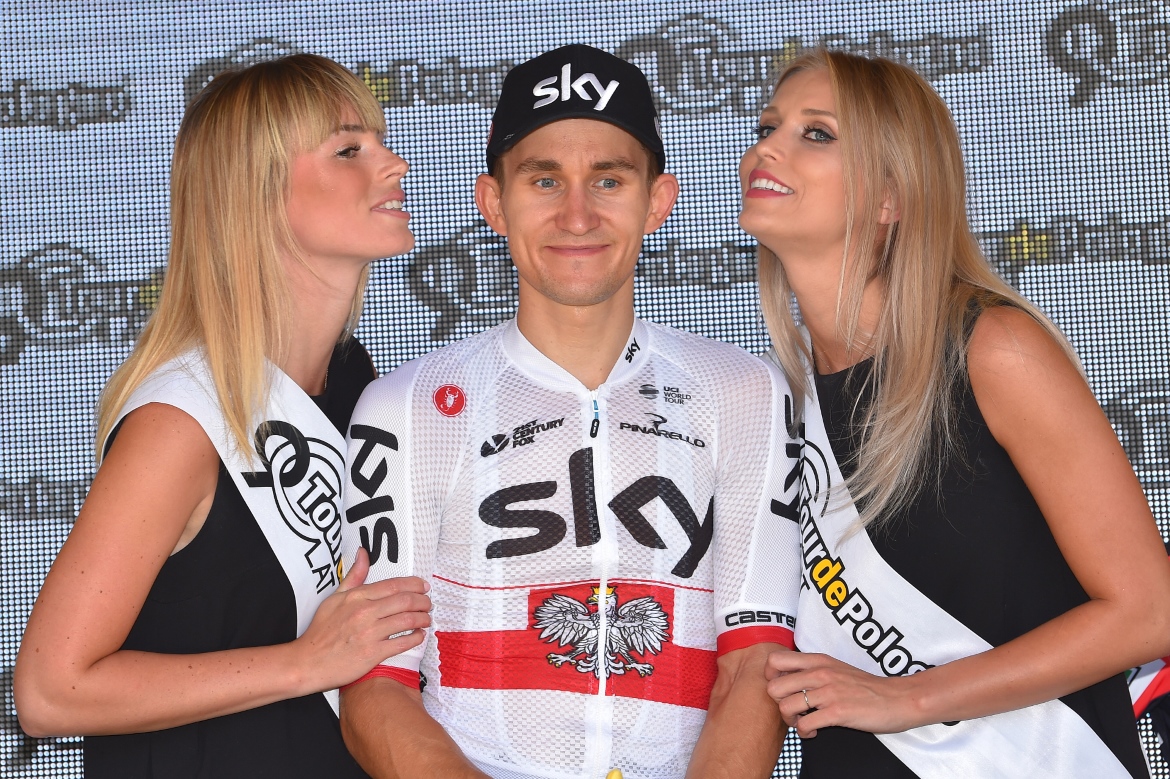
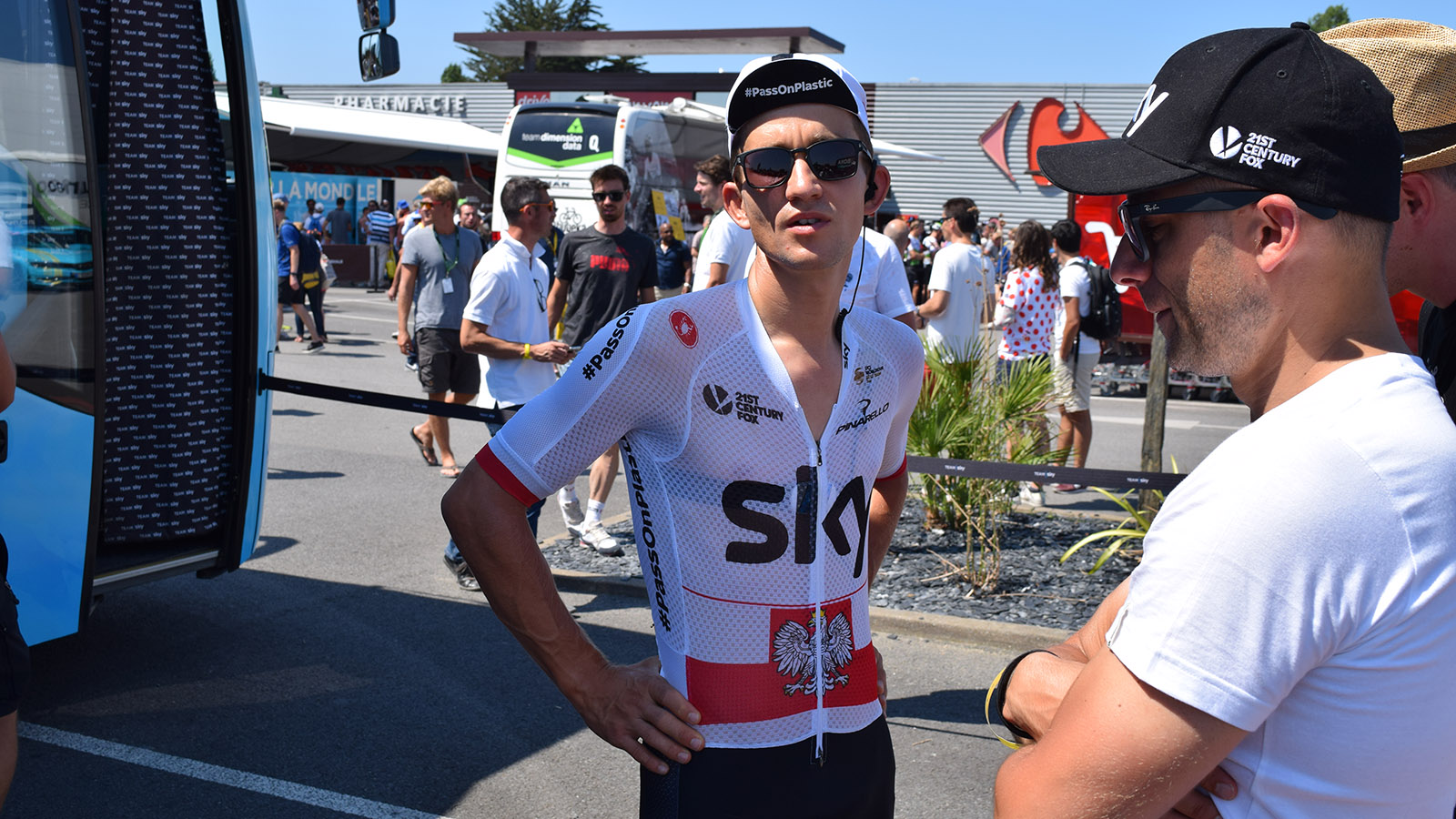
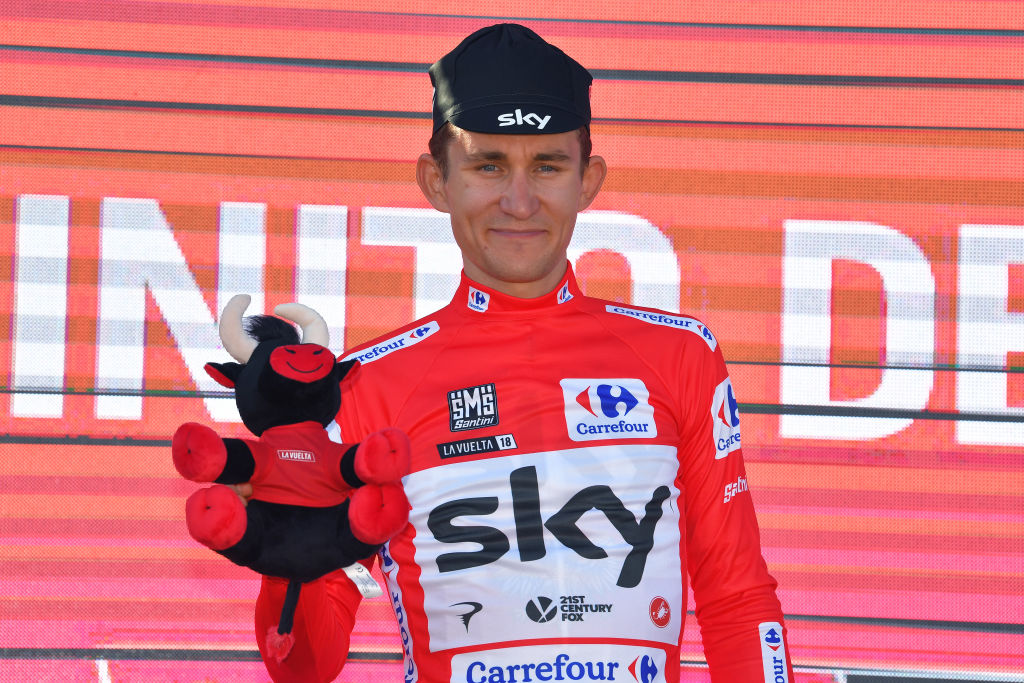
Perhaps the most telling moment of Michal Kwiatkowski’s difficult ascent of La Covatilla at the Vuelta a Espana came not on the 12-kilometre climb itself but just afterwards.
Standing at the windswept summit, a member of the Team Sky staff gave the Polish rider a jacket to wear to keep warm on the six-kilometre descent to the team bus. But the pain in his left arm, injured in the crash on stage 7’s breakneck descent to Pozo Alcon, was too great for Kwiatkowski to put it on.
Instead, Kwiatkowski rode back down the climb, jacketless, weary and presumably mulling over the two minutes lost to the rest of the favourites on the stage.
24 hours later, Kwiatkowski was still visibly tired, with bandages covering his lower left arm, yet he played down his problems. Beaten up and on the back foot he may be, but the GC battle, he told Cyclingnews during the Vuelta’s rest day, goes on.
The arm injury, Kwiatkowski explained, “is not the biggest issue from the crash. The worst thing is my legs feel really tight, all the tendons tightened up from falling so heavily. So I need a lot of treatment and stretching and massage to help with the pain.”
As for whether the crash had a knock-on effect on his ride on La Covatilla, where he lost more than two minutes on the first GC favourite to cross the line, Miguel Angel López (Astana Pro Team), and a little less on the rest of the field, Kwiatkowski does not know.
“But for sure it had an effect on Saturday’s stage,” Kwiatkowski said. “I was not myself that day. If I could have picked one stage of the Vuelta when I would not have thought about GC at all [and targeted the stage win] it would have been that one. But I just wasn’t there, I was suffering like a dog the whole day, following wheels.”
Get The Leadout Newsletter
The latest race content, interviews, features, reviews and expert buying guides, direct to your inbox!
On Friday’s stage, when he had crashed on the descent to Pozo Alcón along with numerous other riders, Kwiatkowski had had a tough time trying to limit the gap as the race roared away from him.
“There was a point [on Friday] when I thought we had made it, and with a little bit of more climbing I would have been back for sure. But once we hit the big flat roads in the last few kilometres with a head-cross wind it was almost an impossible task.”
Kwiatkowski eventually crossed the line 25 seconds down, which, given the circumstances and his injuries, was hardly a defeat.
Come Sunday’s ascent to La Covatilla, Kwiatkowski was initially very close to the front on the first third of the climb, following Rafal Majka’s wheel as the Bora-Hansgrohe man upped the pace. Kwiatkowski explained that his objective was to try and kickstart his system into putting in a great performance. It was something he needed to do, he said, to shake off the bad feelings that Saturday’s under-performance had produced.
“I was trying to do everything not to give up, I really didn’t want to economize. Because when you have a day like Saturday, I wanted to take a different approach, go for a stage win, and that’s why Sky worked on the front before the last climb,” Kwiatkowski said.
“I was trying to do everything I could, which is necessary when you feel like the biggest favourite of that stage. At the end of the day, I might have ended up paying for those ambitions, which could have been a disaster. In the end, I lost two minutes, but it could have been way more.”
Not giving up on GC
As the Vuelta resumes on Tuesday, Kwiatkowski lies 15th overall, 2:10 off the red jersey of Simon Yates (Mitchelton-Scott) and more than a minute outside the top ten, but he is not ready to give up on his GC aspirations just yet.
“I don’t really see myself as losing my chances in the GC,” Kwiatkowski said. “This is a new step, a new experience doing two Grand Tours in a year, and I’ve got a mentality of doing absolutely everything to stay up there.
“So even if I had lost 15 minutes on Sunday [at La Covatilla], I would try to hold on with the best riders anyway. And even if I had crashed badly on Friday, that doesn’t automatically mean I would now just be going for stage wins instead.
“I’m looking at myself as a rider who can achieve much more in the future [on GC] and I don’t want to take a few steps back now because of one stupid crash. Two minutes on the Covatilla won’t change my game-plan. I would regret it if I didn’t try to race with the best climbers.”
Kwiatkowski will now focus on recovering as best he can from his injuries and getting through the next three days before the subsequent trio of set-piece mountain stages GC stages, starting on Friday.
The Pole’s season will end, meanwhile, at the World Championships in Innsbruck on September 30. It has been a long, long season for Kwiatkowski, starting in January with the Volta a La Comunitat Valenciana. Over the course of the year, he has won the Volta ao Algarve, Tirreno-Adriatico, the opening prologue of the Criterium du Dauphiné, the Polish national title and the Tour de Pologne, as well as taking part in the Tour de France, where he worked hard for Chris Froome and Geraint Thomas.
“I’m counting the days,” Kwiatkowski said. “It’s maybe not ideal preparation for the Worlds, or the Vuelta, to have done so many races earlier this season. But I can’t change it now, I could be upset about that, but I don’t want to be, there’s no point. And there’s no time to have a break, reset the motor and start thinking about next season.
“The only thing is to do as I did on Sunday, where even if I wasn’t at 100 percent I was still thinking about winning.”
As for the Worlds, getting a second rainbow jersey after Ponferrada in 2014 remains his last objective of 2018.
“It would be a dream result, I haven’t done the recon. but I will be there for 10 days, doing the team time trial and there’ll be plenty of time for that,” Kwiatkowski said.
“I have to be in the best climbing shape possible and I’m happy that Rafal [Majka] is going there too. We work well together and at the end of the day, it’s a Classic. A bit of recovery after the Vuelta and I should be up there.”
Alasdair Fotheringham has been reporting on cycling since 1991. He has covered every Tour de France since 1992 bar one, as well as numerous other bike races of all shapes and sizes, ranging from the Olympic Games in 2008 to the now sadly defunct Subida a Urkiola hill climb in Spain. As well as working for Cyclingnews, he has also written for The Independent, The Guardian, ProCycling, The Express and Reuters.
